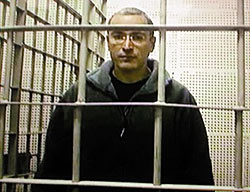Khodorkovsky's "defence" – Some folks just don't get it!
The public calls for the West to apply pressure on Russia will obviously be counterproductive As we go to press, Mr. Khodorkovsky has been found guilty as charged of numerous economic crimes, including fraud, tax evasion and embezzlement as relates to Yukos. We are still awaiting the verdicts as regards the fraudulent Apatit privatization. Furthermore, the Prosecutor's Office has announced that a new slew of charges will be brought – primarily involving money laundering.
As we go to press, Mr. Khodorkovsky has been found guilty as charged of numerous economic crimes, including fraud, tax evasion and embezzlement as relates to Yukos. We are still awaiting the verdicts as regards the fraudulent Apatit privatization. Furthermore, the Prosecutor's Office has announced that a new slew of charges will be brought – primarily involving money laundering.

Given the billions that Menatep has abroad the charges seem well-founded. What we are still awaiting is prosecution for crimes of violence. Nevzlin stands accused of murder, and if the reputation of the Menatep boys is anything to go by (the Apatit privatization alone reportedly could have filled up a small cemetery) there is more to come.
There are two great mysteries here. The first – which we have returned to repeatedly – is how anyone as intelligent as Mikhail could have done something so stupid as to engage in a fight to the death with the Putin administration (perhaps there is something about having grown up in a Soviet-era communal apartment – then finding oneself a multi-billionaire surrounded by scores of adulating flunkies – which causes a loss of the sense of perspective). But the second mystery is, if anything, even more bewildering. What on earth do they expect to gain from their scorched earth tactics against Russia?
Defense counsel Robert Amsterdam has been accusing the Russian government of theft, all matter of human rights violations, and has publicly attempted to pressure, inter alia, the German government to downgrade relations with Russia (with a straight face, in the same interview he also spoke of his “love for Russia”!) Meanwhile, Menatep has been furiously lobbying in Washington against fundamental Russian diplomatic interests, in particular WTO accession.
Of course, the notion that Germany would abandon a vital part of its diplomatic and economic strategy to support a Russian crook in trouble with his own government is laughable. When the Menatep boys requested that the British ambassador write a letter to Putin in support of Khodorkovsky (unlike the fawning response from the US ambassador) they were promptly shown the door. Now, even the Bush administration – which strongly supported Khodorkovsky in the days when it appeared that he could deliver Russia oil to the US – has belatedly realized that they have drilled a dry hole, and seems to show less enthusiasm. Certainly, much of the US Neocon faction is still generously funded by Yukos, so yes, the senators-for-sale that Khodorkovsky once owned in the Russian State Duma have now been replaced by some bought US congressmen. Alas, for the fallen oligarch, their writ extends to the Russian border, but not far beyond. Since it was apparently the promise of support from the American Neocons which led Khodorkovsky to so disastrously overplay his hand, they certainly owe him one!
No, the simple fact is that Amsterdam and his mates have no doubt with the active complicity of the accused, simply succeeded in gaining the worst possible outcome for their client. Their public calls for the West to apply pressure to Russia will obviously be counterproductive: Mr. Putin does not intend to kowtow to the West in the manner of his predecessors. Amsterdam is correct in his assessment that the Russian government has suffered much PR damage from this affaire – certainly, the Menatep PR machine is nothing if not professional. He should bear in mind that the Nazis' siege of Leningrad did infinitely more damage – but Russia never capitulated!
The following is an Op-Ed piece that was published on the BBC web site. It was written in an attempt to re-inject some measure of balance into the discussion of Russia abroad – despite the obvious weakness and some major frustrations, we think Russia remains a great story!
The Twilight of the Oligarch
Russia is open for business and a growing number of Western firms are benefiting hugely from their involvement in Europe's fastest growing economy. That said, there are new rules in place.
The conviction of Yukos/Menatep chief Mikhail Khodorkovsky on charges of fraud and tax evasion is the unfortunate but entirely predictable outcome of President Putin's campaign to break the political power of the “oligarchs” – that small group of vastly wealthy, totally unscrupulous individuals who built their fortunes upon the ruins of the Soviet Union. Although the crimes of the 1990s privatizations have been effectively amnestied, this amnesty is conditional – contingent upon them renouncing their political ambitions and refraining from further economic mischief.
The Russian government is perhaps disingenuous in its claims that Khodorkovsky and his associates are being prosecuted for fraud and tax evasion – other oligarchs guilty of the same crimes have been pardoned after settling some fraction of their back taxes. The difference is that they, unlike Khodorkovsky, were smart enough to quit while they were ahead.
Mr. Khodorkovsky is on trial for having attempted a hostile takeover of the Russian State – the outright purchase of a block of Duma deputies sufficient to block any legislation not to his liking, as well as seeking to hijack Russian economic policy for his own benefit. Yukos wasan oil company with an independent foreign policy and a large, well-paid parliamentary faction – a challenge to the sovereignty of Russia which threatened a return to the “oligarchic model” of the Yeltsin years. Thus Menatep's recent scorched-earth tactics: the corruption of Western foundations and think-tanks, sponsorship of massively negative press coverage of Russia in the media, the purchase of American congressmen, as well as their fierce lobbying against the interests of Russia (most recently in Washington, where they argued for Russia's exclusion not just from the G8 but also from the WTO – a cherished goal for every Russian liberal!).
As regards Russia, the West suffers from a very short memory span, as well as some difficulty in seeing the world from a Russian perspective. In the 1990s, the Oligarchs were roundly excoriated for the brutal, criminal tactics with which they built their empires, as well as for their daylight robbery not just of their own countrymen, but also of Western investors. Certainly, the minority investors in Yukos “daughter companies” who wasted years of fruitless litigation in courts openly controlled by their adversaries will be sceptical of claims by these same oligarchs to have supported Western-style transparent business practices in Russia!
There is one current of thought which defines “democracy” as doing what Washington wishes for one to do – with those who march to a different drummer are variously catalogued as “authoritarian,” “nationalistic,” or in extreme cases, members of some “Axis of Evil.” In fact, as counterintuitive as it may sound, Vladimir Putin is far more “democratic” than were either of his predecessors – after five years in office his popularity ratings remain in the high 60s, as opposed to the high single-digit approval ratings of both Yeltsin and Gorbachev. This can be explained not just by the huge increase in economic prosperity during his presidency, but also, by the fact that – unlike the men who led Russia out of the Soviet period – Putin plays primarily to a domestic audience. After the catastrophic failure of the well-intended but totally misguided attempts at the wholesale import of Western models in the 1990s – which saw Russia weakened, impoverished, and humiliated – Russian public opinion now supports a more nationalistic approach: an independent foreign policy and the exploitation of Russia's vast natural resource base for Russia's own benefit.
Western companies continue to be welcomed in Russia; unlike the case in China where one would struggle to identify Western companies actually making money, in Russia the great majority of ventures have proved highly profitable – in some cases (e.g. BP, IKEA, Auchan) spectacularly so. Except for a handful of resources designated as strategic, the playing field is relatively level, i.e. Westerners face the same hurdles as their Russian competitors – poor infrastructure, venal bureaucrats, and a very problematic court system (sanctity of property rights, on the other hand, is not a problem). Of course, these investors equally benefit from >7% economic growth, soaring personal incomes, weak competition, low taxes, abundant resources, and unlike for many of the other emerging markets, the absence of any significant risk of macroeconomic collapse or political crisis. Despite some sharp ups and down, over the past five years, Russia can boast the world's best performing equity and debt indices, as well as the fastest rate of growth of any Western country; any major European company ignoring her does so at its own risk.
Eric Kraus
© SOVLINK (originally published on May 19)
 Eric Kraus is a Managing Director, Chief Strategist of Sovlink LLC, an independent brokerage and investment-banking boutique. Consistently named in the Institutional Investor best-analyst polls, Mr. Kraus edits Sovlink's flagship strategy publication, Truth and Beauty (and Russian Finance), one of the best-known and most authoritative publications covering the Russian market strategy.
Eric Kraus is a Managing Director, Chief Strategist of Sovlink LLC, an independent brokerage and investment-banking boutique. Consistently named in the Institutional Investor best-analyst polls, Mr. Kraus edits Sovlink's flagship strategy publication, Truth and Beauty (and Russian Finance), one of the best-known and most authoritative publications covering the Russian market strategy.
Subscribe to Pravda.Ru Telegram channel, Facebook, RSS!


